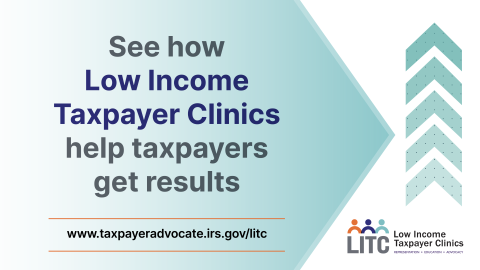

What is a Low Income Taxpayer Clinic (LITC)?
Low Income Taxpayer Clinics (LITCs) assist low-income individuals who have a tax dispute with the IRS and provide education and outreach to individuals who speak English as a second language. Services are offered for free or a small fee. Clinics participating in the LITC Program ensure the fairness and integrity of the tax system for low-income taxpayers.
How do LITCs help taxpayers?
Have you ever wondered exactly what LITCs do? Here are just a few examples of LITC’s recent successes:
- A single mother was out of work and needed surgery. She withdrew funds from her retirement account to pay bills. Unable to make ends meet, with her house in foreclosure and her car needing major repairs, she was referred her to an LITC attorney, who discovered that she had not filed tax returns from 2017 through 2019. The LITC helped her complete the past-due returns, generating refunds of over $21,000. She also received much-needed Economic Impact Payments, resulting in over $2,000 in additional funds. The taxpayer was able to pay off her outstanding debts, with enough left to buy her family a reliable car so she could get back and forth to work after recovering from surgery.
- A low-income veteran with substantial health problems who worked as a truck driver didn’t keep records of his business expenses. He owed over $100,000 in federal taxes. The taxpayer reached out to an LITC for help when the IRS threatened to seize his home. He had enough equity in his house to pay the liability, but the LITC demonstrated that the taxpayer could not rent a home for less than his low mortgage payment and successfully advocated to have the taxpayer’s liability be placed in currently-not-collectible status, allowing him to keep his home.
- A taxpayer was referred to an LITC after the IRS held 2019 tax refund of over $6,000 because she had not yet filed a 2017 tax return. The taxpayer hadn’t filed because she thought she had been misclassified as an independent contractor. The LITC attorney worked with the taxpayer to file a Form SS-8, Determination of Worker Status for Purposes of Federal Employment Taxes and Income Tax Withholding, to challenge her employment status. The LITC also helped the taxpayer file her 2017 tax return and gather proof of her financial hardship. The LITC worked with the Taxpayer Advocate Service to have only part of the taxpayer’s 2019 refund applied to the 2017 tax liability, resulting in nearly $5,000 being refunded to the taxpayer to relieve her hardship.
How you can help
The LITC grant application period is open until June 16. More information about LITCs and the work they do to represent, educate and advocate on behalf of low-income and ESL taxpayers is available in IRS Publication 5066, LITC 2021 Program Report. A complete overview of the requirements to be an LITC can be found in Publication 3319, LITC Grant Application Package and Guidelines. A short video about the LITC program is also available.
